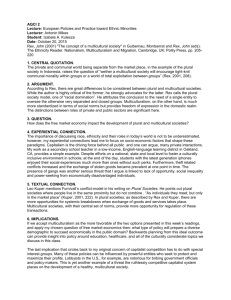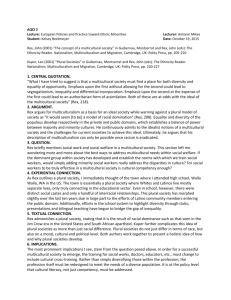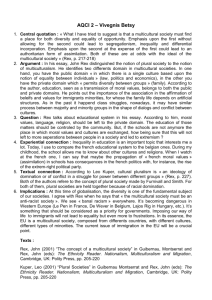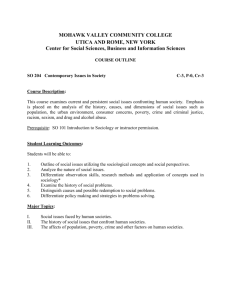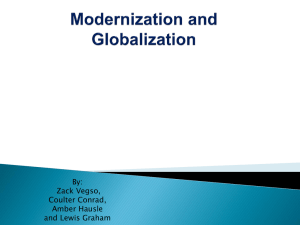Mirka Snopčokova
advertisement
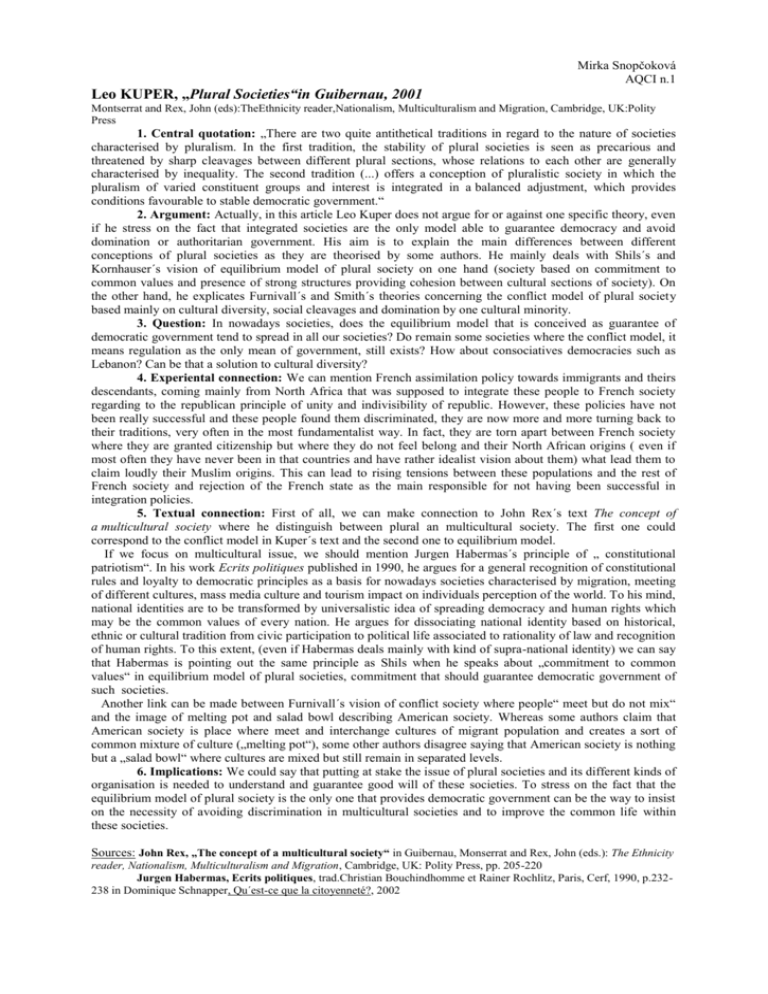
Mirka Snopčoková AQCI n.1 Leo KUPER, „Plural Societies“in Guibernau, 2001 Montserrat and Rex, John (eds):TheEthnicity reader,Nationalism, Multiculturalism and Migration, Cambridge, UK:Polity Press 1. Central quotation: „There are two quite antithetical traditions in regard to the nature of societies characterised by pluralism. In the first tradition, the stability of plural societies is seen as precarious and threatened by sharp cleavages between different plural sections, whose relations to each other are generally characterised by inequality. The second tradition (...) offers a conception of pluralistic society in which the pluralism of varied constituent groups and interest is integrated in a balanced adjustment, which provides conditions favourable to stable democratic government.“ 2. Argument: Actually, in this article Leo Kuper does not argue for or against one specific theory, even if he stress on the fact that integrated societies are the only model able to guarantee democracy and avoid domination or authoritarian government. His aim is to explain the main differences between different conceptions of plural societies as they are theorised by some authors. He mainly deals with Shils´s and Kornhauser´s vision of equilibrium model of plural society on one hand (society based on commitment to common values and presence of strong structures providing cohesion between cultural sections of society). On the other hand, he explicates Furnivall´s and Smith´s theories concerning the conflict model of plural society based mainly on cultural diversity, social cleavages and domination by one cultural minority. 3. Question: In nowadays societies, does the equilibrium model that is conceived as guarantee of democratic government tend to spread in all our societies? Do remain some societies where the conflict model, it means regulation as the only mean of government, still exists? How about consociatives democracies such as Lebanon? Can be that a solution to cultural diversity? 4. Experiental connection: We can mention French assimilation policy towards immigrants and theirs descendants, coming mainly from North Africa that was supposed to integrate these people to French society regarding to the republican principle of unity and indivisibility of republic. However, these policies have not been really successful and these people found them discriminated, they are now more and more turning back to their traditions, very often in the most fundamentalist way. In fact, they are torn apart between French society where they are granted citizenship but where they do not feel belong and their North African origins ( even if most often they have never been in that countries and have rather idealist vision about them) what lead them to claim loudly their Muslim origins. This can lead to rising tensions between these populations and the rest of French society and rejection of the French state as the main responsible for not having been successful in integration policies. 5. Textual connection: First of all, we can make connection to John Rex´s text The concept of a multicultural society where he distinguish between plural an multicultural society. The first one could correspond to the conflict model in Kuper´s text and the second one to equilibrium model. If we focus on multicultural issue, we should mention Jurgen Habermas´s principle of „ constitutional patriotism“. In his work Ecrits politiques published in 1990, he argues for a general recognition of constitutional rules and loyalty to democratic principles as a basis for nowadays societies characterised by migration, meeting of different cultures, mass media culture and tourism impact on individuals perception of the world. To his mind, national identities are to be transformed by universalistic idea of spreading democracy and human rights which may be the common values of every nation. He argues for dissociating national identity based on historical, ethnic or cultural tradition from civic participation to political life associated to rationality of law and recognition of human rights. To this extent, (even if Habermas deals mainly with kind of supra-national identity) we can say that Habermas is pointing out the same principle as Shils when he speaks about „commitment to common values“ in equilibrium model of plural societies, commitment that should guarantee democratic government of such societies. Another link can be made between Furnivall´s vision of conflict society where people“ meet but do not mix“ and the image of melting pot and salad bowl describing American society. Whereas some authors claim that American society is place where meet and interchange cultures of migrant population and creates a sort of common mixture of culture („melting pot“), some other authors disagree saying that American society is nothing but a „salad bowl“ where cultures are mixed but still remain in separated levels. 6. Implications: We could say that putting at stake the issue of plural societies and its different kinds of organisation is needed to understand and guarantee good will of these societies. To stress on the fact that the equilibrium model of plural society is the only one that provides democratic government can be the way to insist on the necessity of avoiding discrimination in multicultural societies and to improve the common life within these societies. Sources: John Rex, „The concept of a multicultural society“ in Guibernau, Monserrat and Rex, John (eds.): The Ethnicity reader, Nationalism, Multiculturalism and Migration, Cambridge, UK: Polity Press, pp. 205-220 Jurgen Habermas, Ecrits politiques, trad.Christian Bouchindhomme et Rainer Rochlitz, Paris, Cerf, 1990, p.232238 in Dominique Schnapper, Qu´est-ce que la citoyenneté?, 2002

